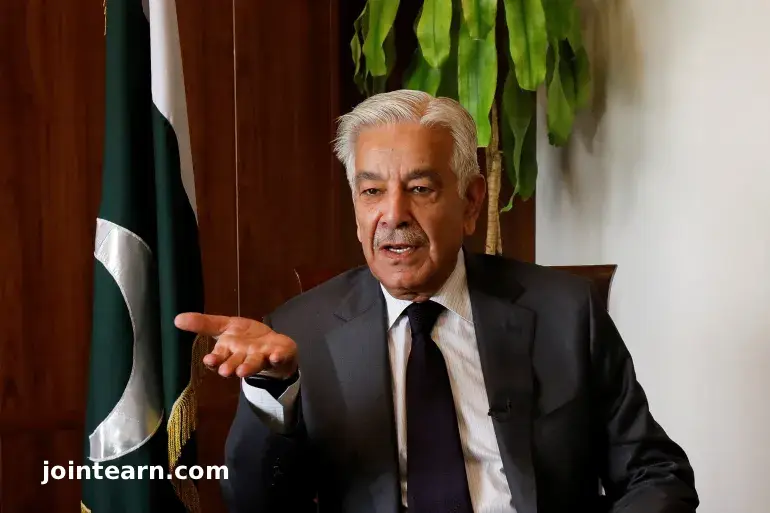
Defence Minister Khawaja Muhammad Asif issues stark warning amid ongoing Pakistan-Afghanistan negotiations in Istanbul following the Doha ceasefire.
Pakistan Threatens ‘Open War’ If No Peace Agreement Is Reached
Pakistan’s Defence Minister Khawaja Muhammad Asif has warned that the country is prepared for an “open war” with Afghanistan if ongoing peace talks in Istanbul fail to secure a permanent agreement. His statement marks a dramatic escalation in rhetoric as both nations attempt to stabilize their volatile border region following a Qatar- and Turkiye-brokered ceasefire last week.
“We have the option, if no agreement takes place, we have an open war with them,” Asif declared during a public address in Sialkot, eastern Pakistan, on Saturday.
“But I saw that they want peace,” he added, suggesting cautious optimism despite mounting tensions.
The two-day Istanbul talks, which began Saturday, are aimed at consolidating the fragile truce reached in Doha, following weeks of deadly cross-border clashes that claimed dozens of lives and wounded hundreds more.
Ceasefire Holds Amid Fragile Trust
According to Al Jazeera’s Sinem Koseoglu, the meetings in Turkiye are “technical-level talks designed to pave the way for a long-term peace framework between the two neighbors.”
The Afghan delegation is led by Deputy Interior Minister Haji Najib, while Islamabad has yet to disclose details about its representatives. A spokesperson for Pakistan’s Foreign Ministry emphasized that the agenda includes addressing terrorist activities originating from Afghan territory.
“The negotiations must address the menace of terrorism emanating from Afghan soil towards Pakistan,” the spokesperson said on Friday.
Pakistan has repeatedly accused Afghanistan’s Taliban-led government of harboring militant groups, including the Tehreek-e-Taliban Pakistan (TTP), responsible for numerous attacks inside Pakistani territory. Kabul, however, denies these allegations, accusing Islamabad of violating Afghan sovereignty through air strikes and cross-border shelling.
Economic Toll Mounts as Border Crossings Stay Closed
Trade between the two countries has nearly ground to a halt as key border crossings remain closed. According to Afghanistan’s Chamber of Commerce and Industry, the shutdown is costing millions of dollars daily, impacting businesses and border communities reliant on cross-border trade.
Both sides have signaled that reopening trade routes will depend on progress in Istanbul, where negotiators hope to create a mechanism for joint intelligence-sharing and border security coordination.
Intelligence-Sharing at the Heart of Negotiations
Ibraheem Bahiss, an analyst with the International Crisis Group, told AFP that a key component of the Istanbul talks involves developing a mutual security framework targeting cross-border militancy.
“For example, Pakistan would provide coordinates of where they suspect TTP fighters or commanders are, and instead of conducting strikes, Afghanistan would be expected to act against them,” Bahiss explained.
This approach could prevent future Pakistani air raids on Afghan territory, which Kabul has condemned as aggressive and destabilizing. If implemented effectively, analysts say the framework could mark a significant step toward restoring regional security cooperation.
Signs of Stability After the Doha Agreement
Despite the uncertainty, officials in Islamabad report tentative improvements since the Doha ceasefire took effect last Sunday.
“There has been no major full-scale terrorist attack emanating from Afghan soil in the last two to three days,” said Tahir Andrabi, spokesperson for Pakistan’s Foreign Ministry.
“The Doha talks were fruitful. We hope the positive trend continues through and after the Istanbul meetings.”
However, observers warn that trust remains fragile, and any resurgence of violence could derail the peace process entirely.
Regional Implications: South Asia’s Fragile Balance
The outcome of the Istanbul negotiations holds significant implications for regional stability in South and Central Asia. Persistent tensions between Pakistan and Afghanistan risk disrupting counterterrorism efforts, trade routes, and diplomatic relations involving neighboring powers such as China, Iran, and India.
Analysts note that both sides face domestic pressure: Pakistan grapples with rising militancy in its northwestern provinces, while Afghanistan’s Taliban government is struggling to maintain control over security and economic policy amid isolation from the international community.
If the talks collapse, experts warn of potential military escalation along the Durand Line, a heavily disputed border that has long been a flashpoint between the two nations.


Leave a Reply